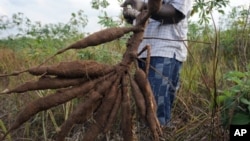In a recent report the World Food Program (WFP) and the Food and Agriculture Organization (FAO) say that 22 countries are experiencing protracted food insecurity, and 17 of those countries are in Africa.
In their report, the WFP and FAO, say that despite a recent decline, 925 million people, or 16 percent of the population in developing countries remain undernourished. They add that 20 percent of all undernourished people are to be found in the 22 countries experiencing protracted food insecurity.
WFP spokesman Peter Smerdon says that several problems taken together defines protracted food insecurity.
"Countries considered as being in a protracted crisis are those reporting a food crisis for eight years or more, and they have received more than 10 percent of foreign assistance as humanitarian emergency relief, and they are on the list of low food deficit countries," he noted.
Smerdon notes that in many cases, such as Somalia, countries experiencing protracted food insecurity, also have conflict and weak governments.
"In addition there is often weak governance, or poor public administration if any, in places such as Somalia for instance and [the Democratic Republic of] Congo," he added.
Smerdon adds that when conflict or droughts last several years, or rains decrease due to global warming often the result is that livelihoods become unsustainable to a point where they will never recover.
"Then people like pastoralists, nomadic herders who rely on the rain to keep the livestock alive, get into long term problems when their animals are killed by drought and therefore they never recover, they can never actually rebuild their herds to what is sufficient to keep them alive," he said.
The report notes that most countries in protracted crisis received less development assistance per person than the average for least-development countries. In particular agriculture, which supports two-thirds of their populations, received just three to four percent assistance.
Smerdon says this is because the focus is on saving lives, and donors often feel it is too soon to provide development help when a country is in crisis. He adds that a balance needs to be found in order to arrest chronic crises.
"You have to do both things, you have to do both development and emergency assistance to keep people alive to reverse the situation, otherwise you are just going to be stuck in a protracted crisis, and have to, have to keep trying to put out the fire, but you are not actually changing the structure of the crisis at all," he added.
Smerdon says the WFP has begun with a program called procurement for progress which sources emergency food supplies very close to areas of crisis, making it assistance rather than aid.
"And it means that the people on the edge of the areas in crisis because of drought build up some resilience, because they are getting money for the food they produce, they are not just getting bad rates from traders who then take the food, and they don't make a real profit," he said. "So it helps farmers to start standing on their own feet rather than becoming victims the next year to the effects of a protracted drought."
Smerdon adds that for those countries in conflict, one of the first requirements to rebuilding sustained livelihoods, will be to end the conflict.
WFP: 17 African Countries Have Protracted Food Insecurity




